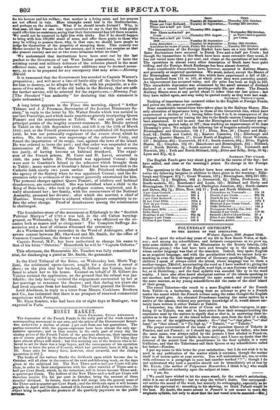POLYNESIAN ORTHOEPY.
TO THE EDITOR OF THE SPECTATOR.
Woburn Square, 20th August 1844.
SIR —I spent the school-day years of my life in New South Wales, at Syd- ney; and among my schoolfellows, and intimate companions as we grew up, were some children of one of the Missionaries to the Society Islands, (the Taheitean group,) who had been born and brought up in the islands, and whose earlier language was that of the islanders. Indeed, they spoke English as an acquired language, and with the peculiarities which we cannot help re- marking in even the best-taught natives of Germany speaking English. The children I speak of always called the island, whose language was to them a mother-tongue, T8beit6, accentuating the word as I have marked it ; giving the second syllable the sound of the English word high, or ass German would sound hei, as in Heidelberg; and the final syllable was sounded like ty in the word mighty. I have also often heard aboriginal natives of the islands speakingto one another, and they always produced the same sound, and accentuated in the same manner, as my young schoolfellows did the name of the chief island of their group. The sound Taheetee—the result to a mere English reader of the French form Tahiti—is a barbarism, arising from an attempt to give to a French reader the sound which the French writers using the name thought the English Tabeite would give. An educated Frenchman hearing the name spoken by a native of the islands, without any previous knowledge of it, would almost cer- tainly have written it either Tahaiti or Taheiti. I remember, too, that the error of COOK and his fellow-voyagers, in pre- fixing 0 to Tabeite, was said to have arisen from their misapprehending the expression used by the natives to signify that or that is, in answering their in- quiries as to the name of the island before them, seen from the deck of a ship, or from one of the neighbouring islands : 0—" that "—" that place "—",that land," or "that island," is " Ta-high-ty," " Tabaiti," "or " Tahate." The proper accentuation of the name of the quondam Queen of Taheite is PomAre, and not Pomare; or I should say, perhaps, that her father, who bore the same name, was always called by the persons I first alluded to roma-re, (the ma like the second syllable in mom-ma); and I have no doubt that the removal of the accent from the penultimate to the final syllable is a mere Gallicism, and that the Tabeiteans call their Queen as my schoolfellows called her father—Pom5.re.
I put my name to this letter for your satisfaction; but I do not wish it to be used in any publication of the matter which it contains, though the matter itself is of course quite at your service. You will understand me, too, to write with reference to a paragraph in your last number marked " ? " ; though I do not understand why such a question should not be immediately set at rest by Mr. ELLts, (the author of Polynesian Researches, 1 think it is,) who would
be a very sufficient authority upon the subject at issue. I am, &c.
[We could have wished to let the name stand, for the reader's satisfaction, since it is one of authority : but we obey the writer's desire. Our correspontl- ent settles the sound of the word, but scarcely its orthography, especially as be adopts the equivocal ei: according to his showing, we think Tahaiti would be the best. No doubt, the acute accent in Pomare is mot meant to mark-the emphatic syllable, but only -to show that the last-vowel into be sounded.—D,]


























 Previous page
Previous page